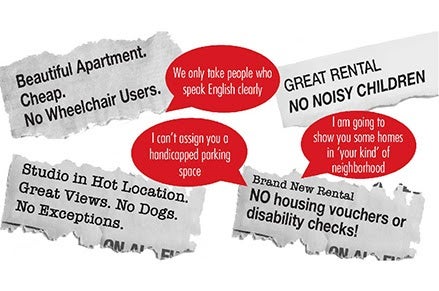
Even in 2021, fair housing laws are still vital resources to protect people against discrimination in the housing and rental market.
Fair Housing Month, which takes place each April, is an opportunity to revisit the laws in place, the people they protect and the instances of discrimination they protect against.
What is Fair Housing Month?
Fair Housing Month was created after President Lyndon Johnson signed the Fair Housing Act into law in April 1968 as part of the Civil Rights Act of 1968.
This landmark piece of civil rights legislation was passed during a difficult and tumultuous time in American history. Congress considered the fair housing bill several times between 1966 and 1967 to address housing discrimination in its many forms; however, the bill failed to gain enough votes for the majority needed to pass.
The assassination of Rev. Dr. Martin Luther King, Jr. on April 4, 1968, sent the country into tragedy, further affirming the need for another Civil Rights Act. Open housing marches and fair housing advocacy were closely tied to Dr. King and his life’s work. President Lyndon Johnson urged Congress to quickly approve the bill in the wake of Dr. King’s passing as a fitting memorial to his incomparable achievements and legacy in the name of Civil Rights.
As years passed, the tradition of Fair Housing Month grew and spread across the country. Governors began to issue proclamations that designated April as "Fair Housing Month.” The month continues to be promoted and taught in schools and in local communities across the country.
Protection Under the Fair Housing Act
Under the Federal Fair Housing Act, it is illegal for leasers, sellers, financiers, insurers or agents to discriminate against people based on race, disability, sex, national origin, color, religion or family status.
This law works alongside the Equal Credit Opportunity Act, which prohibits creditors from discriminating based on marital status, age, because an applicant receives income from a public assistance program or because an applicant has in good faith exercised any right under the Consumer Credit Protection Act.
Even with these federal protections in place, discrimination in the housing market remains an issue that can sometimes be hard to spot.
Types of Protected Classes and Examples of Discrimination

Under the Fair Housing Act, it is illegal to discriminate on the basis of the following classes in the sale, rental, financing of dwellings, and in other housing-related transactions.
- Disability: Examples of discrimination based on disability include refusing a person's request to make reasonable modifications of existing premises or charging additional rent or fees for using an assistance animal, when the use of an assistance animal may be necessary to afford such person full enjoyment of the premises.
- Race or Color: Examples of discrimination based on race or color include applying different terms and conditions of housing, denying an application or steering a person to one area of a building or complex because of race or color.
- Familial Status: Examples of discrimination based on familial status in including advertising housing stating that children are not wanted, charging families higher rent or related fees because they have a child or restricting families with children to one area of a building or complex.
- National Origin: Examples of discrimination based on national origin include administering rules and procedures that unfairly target a person based on national origin, denying a housing application or evicting persons because of national origin.
- Sex: Examples of discrimination based on sex include applying different terms and conditions of housing because of sex, refusing to rent to a person who resists the landlord's sexual advances or making life difficult for a tenant who has resisted such advances.
- Religion: Examples of discrimination based on religion include applying different terms and conditions of housing, denying a housing application or steering a person to one area of a building or complex based on religion.
Resources in Chandler: Get Assistance
Chandler’s Fair Housing Program operated by the City’s Neighborhood Resources Department offers outreach services and education resources for people affected by potential instances of housing discrimination. The department also offers a free Fair Housing training session available for tenants, landlords and the general public to learn more and ensure housing is fair and equitable for all.
The City of Chandler takes housing discrimination complaints seriously. If you suspect you have been discriminated against in housing, please contact the Fair Housing program at 480-782-4323 to assist with housing counseling and filing a complaint with the Office of the Arizona Attorney General Civil Rights Division.
The Arizona Relay Service (7-1-1) provides free 24-hour telephone access for the deaf, hard of hearing, deaf-blind and hearing or speech impaired.
- 1-800-367-8939 (TTY)
- 1-800-842-4681 (Voice)



